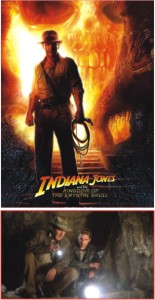Movie Review
Indiana Jones Strikes again
Tawsif Saleheen
 AS the newest Indiana Jones sequel hits the theatres, Harrison Ford takes the term 'young at heart' to a brand new level. He dons his khaki, lashes his whip and pulls off stunts that are good enough to make an average columnist, such as yours truly, feel rather flabby. As it turns out, this particular Ford has quite a bit of a mileage left. AS the newest Indiana Jones sequel hits the theatres, Harrison Ford takes the term 'young at heart' to a brand new level. He dons his khaki, lashes his whip and pulls off stunts that are good enough to make an average columnist, such as yours truly, feel rather flabby. As it turns out, this particular Ford has quite a bit of a mileage left.
Being released after 19 years, the fourth movie of the Indy series had a lot of challenge ahead of itself. For starters, the cowboy whip made iconic by Indiana Jones is now more commonly associated with a dominatrix, and his fedora is almost prehistoric. Yet, it is perhaps the revival of these antique Indy elements that makes the movie enjoyable in the end of the day.
The storyline of Indiana Jones and the Kingdom of the Crystal Skull is embarrassingly flimsy. The movie begins in the Nevada desert, where a sword brandishing KGB agent (played unconvincingly by Cate Blanchett) kidnaps Indiana Jones because of what he knows about a mysterious mummy hidden in the same warehouse where the Lost Ark was stashed at the end of the first movie. Indy conveniently throws a couple of punches and escapes from the warehouse, only to find himself in the test site of a nuclear missile. Professor Jones then demonstrates that it is possible to survive a nuclear blast by locking yourself up in a refrigerator, a trick that the residents of Hiroshima were sadly unaware of.
The rest of the movie is pretty much a blur of chase and counter-chase, almost like the Road Runner but only less funnier. What saves the movie in the end of the day, and in fact makes a rather fun flick out of it, is Harrison Ford's star performance as Indiana Jones. He looks livelier than our average superhero, and if he is really sixty years old I want to know what vitamins he takes.
All in all, although Indiana Jones and the Kingdom of the Crystal Skull suffers in terms of plotline, the wacky action sequences almost make up for it. Professor Jones's return for the exile should have been grander. Nonetheless, we are glad that he returned.
| 